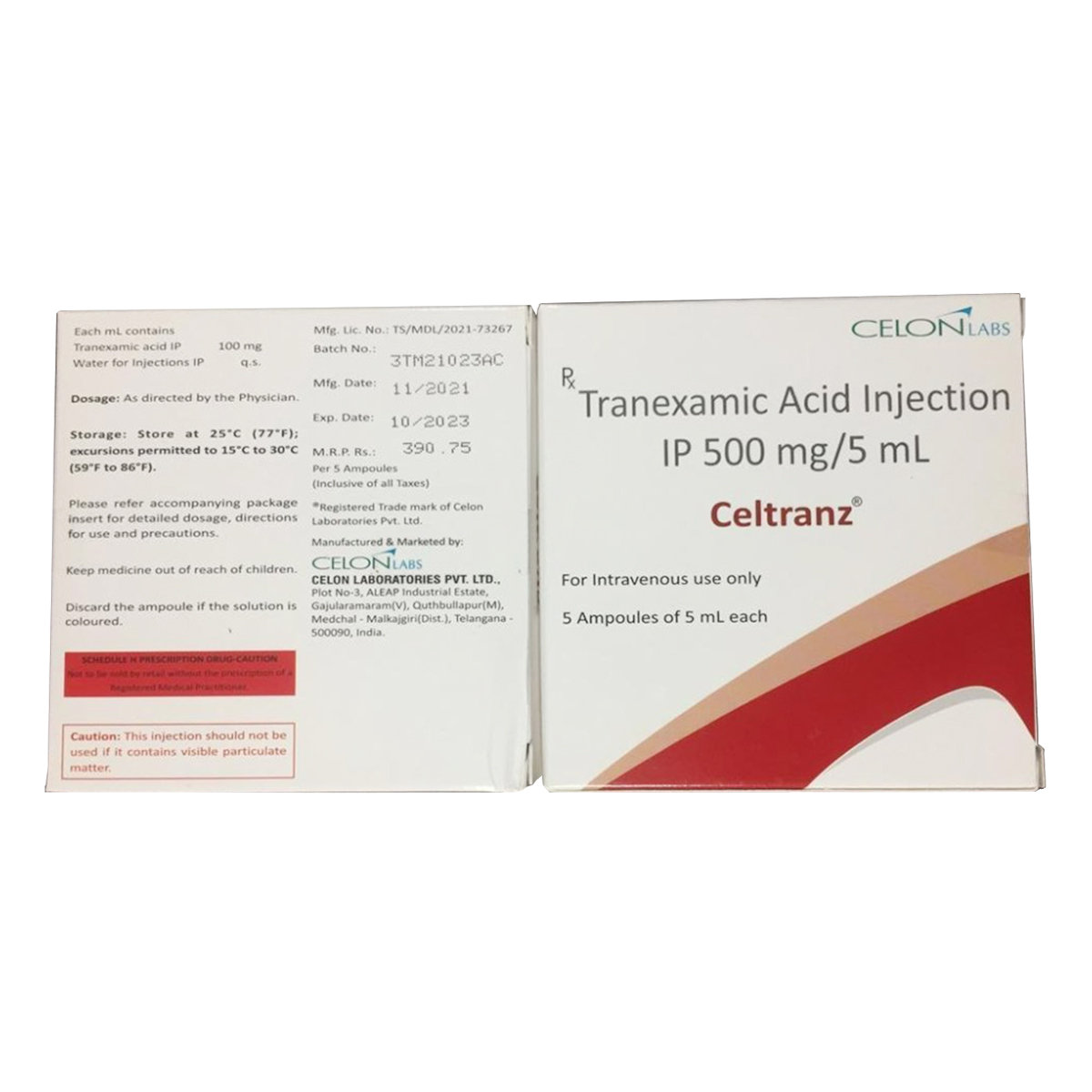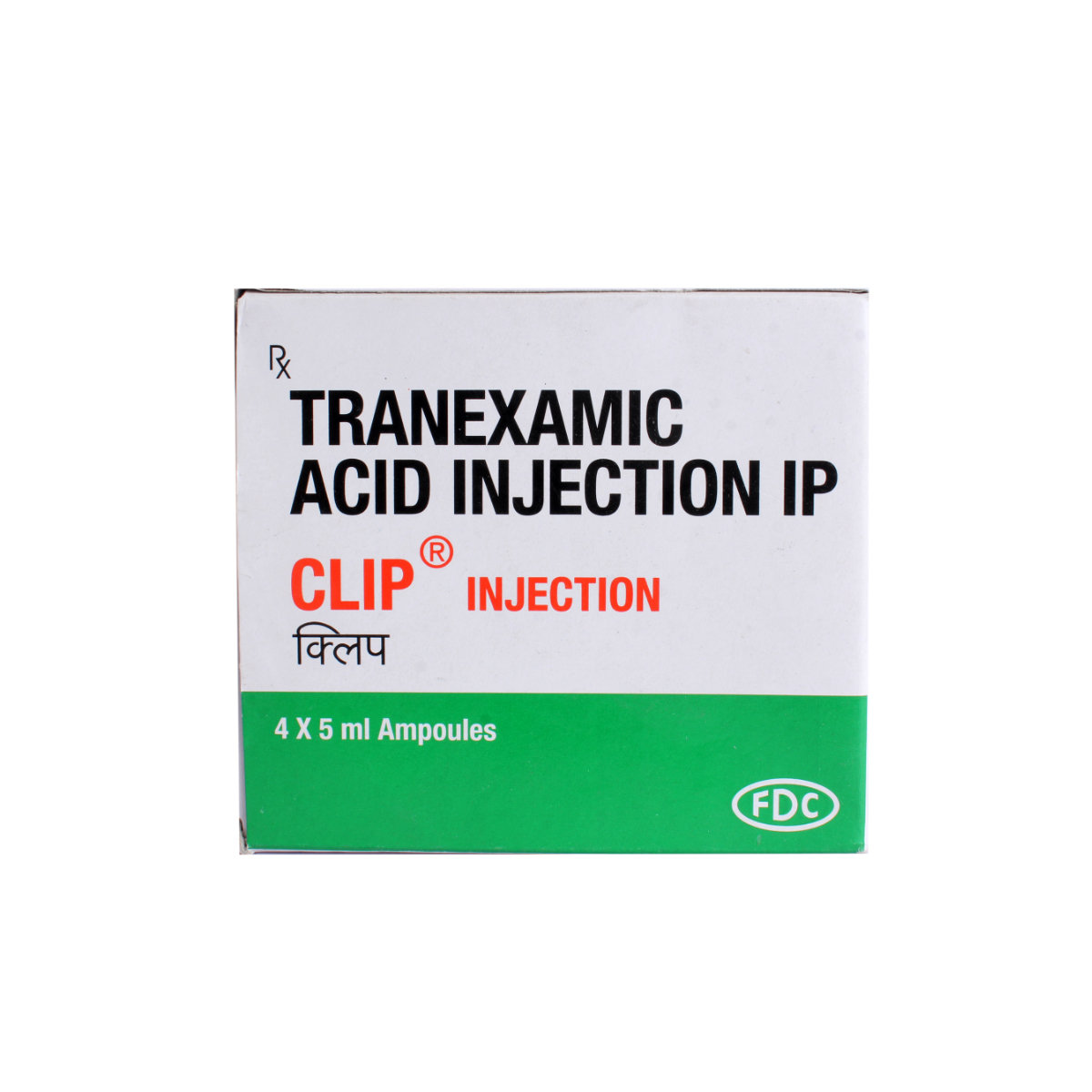Tranexamic Acid
About Tranexamic Acid
Tranexamic Acid is used to treat abnormal or unwanted bleeding. It is used to control bleeding in conditions such as heavy periods, nose bleeds (epistaxis), cervical surgery, prostate surgery, bladder surgery (post-cystectomy), bleeding inside the eye (traumatic hyphaema) and a hereditary disease called angioneurotic oedema (HANO).
Tranexamic Acid contains ‘tranexamic acid’, which acts by regulating the breakdown of blood clots. It blocks the release and action of plasmin, an enzyme essential for the breakdown of clots present in the blood.
Some patients may experience certain side effects, such as feeling sick (nausea), diarrhoea, and itchy skin. These side effects usually go away on their own. If you develop any other serious side effects, such as vision problems, while using Tranexamic Acid, consult your doctor immediately.
Tranexamic Acid should be taken as advised by your physician. The dose and duration of the medicine will be decided by your doctor based on your health condition. Do not chew, crush, or break the medicine.
Tranexamic Acid should be avoided if you are allergic to it or if any other ingredients are present in it. Do not take this medicine if you have a history of kidney disease, thrombosis (formation of blood clots in the blood vessels), disseminated intravascular coagulation (a disease where blood clots form throughout your body), or seizures (fits). Inform your doctor if you are pregnant, planning to become pregnant or breastfeeding.
Uses of Tranexamic Acid
• Menorrhagia Management: Tranexamic Acid is commonly used to manage heavy menstrual bleeding (menorrhagia) in women, helping to regulate menstrual flow effectively.
• Trauma Treatment: Tranexamic Acid may be prescribed for individuals experiencing trauma to help control bleeding during and after the incident.
• Endometriosis Treatment: Tranexamic Acid is effective in reducing heavy bleeding linked to endometriosis, offering relief from associated symptoms.
• Bleeding Disorders Aid: Tranexamic Acid is also recommended for certain bleeding disorders, aiding in the prevention and reduction of bleeding episodes.
Medicinal Benefits
- Tranexamic Acid contains ‘tranexamic acid’, which belongs to the class of ‘anti-fibrinolytic agents’.
- It acts by regulating the breakdown of blood clots in the body.
- It blocks the release and action of plasmin, an enzyme essential for the breakdown of clots in the blood. This effect helps to slow down abnormal bleeding.
- Tranexamic Acid is generally used for short-term treatment of bleeding.
Directions for Use
- Tranexamic Acid can be taken with or without food.
- It is usually taken 2-3 times a day or as prescribed by your doctor.
- Swallow Tranexamic Acid as a whole with a glass of water.
- Do not crush, break, or chew it.
Storage
Side Effects of Tranexamic Acid
- Nausea
- Diarrhea
- Itchy skin
- Pain at the injection site
- Vision problems
- Vomiting
Drug Warnings
- Tranexamic Acid should be avoided if you are allergic to it or if any other ingredients are present in it.
- Before taking Tranexamic Acid, inform your doctor if you notice blood in your urine (except during periods) or have a history of uncontrollable bleeding, disseminated intravascular coagulation (DIC), irregular periods, or kidney disease.
- Also, inform your doctor if you or your family has a history of thrombosis (formation of blood clots in the blood vessels).
- Let your doctor know if you are taking medicine to treat a hereditary disease called angioneurotic oedema (HANO) every day for a long time.
- Your doctor may advise regular eye tests and blood tests to check your vision problems and also liver/kidney functioning.
- Inform your doctor if you are using birth control pills, including the patch, vaginal ring, and an intrauterine device (IUD), as there is a risk of deep vein thrombosis (a condition in which a blood clot is formed in the deeper vein, mostly the legs).
- Inform your doctor if you are using fibrinolytic agents (drugs that break blood clots) such as streptokinase, as they may stop the effect of Tranexamic Acid.
- Inform your doctor if you are pregnant, planning to become pregnant or breastfeeding.
Drug Interactions
Drug-drug interactions: Tranexamic Acid may interact with birth control pills, fibrinolytic drugs (streptokinase, urokinase, reteplase, alteplase, and tenecteplase, etc.), an antipsychotic drug (chlorpromazine), and a drug used to treat blood cancer (tretinoin) and progestins (levonorgestrel).
Drug-food interactions: No interactions found.
Drug-disease interactions: Tranexamic Acid should not be used in patients with a history of colour vision defect, active intravascular clotting, intracranial haemorrhage, seizures (fits) and renal dysfunction.
Drug-Drug Interactions Checker List:
Safety Advice

Alcohol
unsafeTranexamic Acid may not interact with alcohol. However, avoid the consumption of alcohol as it may worsen your health condition.

Pregnancy
consult your doctorTranexamic Acid is a category B medicine and may not cause toxic effects to the fetus. However, it should be used only when prescribed by a doctor for pregnant women.

Breast Feeding
consult your doctorTranexamic Acid should be used in breastfeeding mothers only if prescribed by a doctor.

Driving
unsafeTranexamic Acid may cause dizziness. Hence, it is advised to avoid driving or operating machines for some period after taking Tranexamic Acid.

Liver
cautionTranexamic Acid should be used with caution in patients with liver diseases. Your doctor may suggest a dose adjustment if needed based on your health condition.

Kidney
cautionTranexamic Acid should be used with caution in patients with kidney diseases. Your doctor may suggest a dose adjustment if needed based on your health condition.

Children
consult your doctorTranexamic Acid should be used in children under 12 years of age only if clinically needed. The child specialist makes dose adjustments.
Habit Forming
Diet & Lifestyle Advise
- Ask your doctor about the exercises you prefer based on your health condition.
- Stay hydrated and consume plenty of fluids. Fluids are necessary to maintain blood flow in your body.
- Consume fresh fruits and vegetables. Consult a dietitian and prepare a diet plan. Eating healthy can help you to recover faster.
Special Advise
- Your doctor may suggest regular eye check-ups while taking Tranexamic Acid.
- Increased risk of blood clot formation when co-administered with a combination oral contraceptive. Consult your doctor before taking any medication.
Patients Concern
Disease/Condition Glossary
Menorrhagia: It is a condition characterized by heavy or prolonged bleeding during menstrual periods which last for more than seven days
Epistaxis: Bleeding from the nose when the blood vessels of the nose lining burst. This can occur due to dryness or nose injury.
Post-operative bleeding: It is bleeding after surgery due to the blood vessel rupture. Some people may experience mild to severe bleeding due to cuts made during surgery.
Traumatic hyphema: This is a condition characterized by blood in the anterior chamber of the eye due to a blunt injury. It may also result in vision loss.
Hereditary angioneurotic edema (HANO): It is a hereditary disease that causes recurrent painless swelling under the skin.
Dental Procedures: It is a procedure involving dental issues during which bleeding occurs.
FAQs
Tranexamic Acid is used to treat abnormal or unwanted bleeding.
Tranexamic Acid is an antifibrinolytic agent that can stop the bleeding effectively. It stops the breakdown of blood clots by inhibiting the action of plasmin (an enzyme essential for the breakdown of blood clots).
Tranexamic Acid should be used temporarily to control bleeding. Do not use it frequently or for a long time without consulting your doctor.
Tranexamic Acid cannot stop periods. It can only reduce the bleeding in cases of heavy bleeding. However, do not use this medicine for any indication without consulting your doctor.
Tranexamic Acid should not be taken with birth control pills, including the vaginal ring, intrauterine device and the patch, as there is a risk of ‘deep vein thrombosis’ (formation of a blood clot in the deeper vein, mostly legs). So, inform your doctor before taking Tranexamic Acid, if you are taking any birth control pills.
Tranexamic Acid may not affect fertility. It is used to stop abnormal bleeding during heavy periods. Inform your doctor before using this medicine to avoid any unwanted side effects.
Tranexamic Acid can be used in children with caution. Your doctor may make dose adjustments based on the age, weight and health condition of your child.
Tranexamic Acid may cause side effects such as nausea, diarrhoea and itchy skin in some patients. If these side effects persist or worsen, please consult your doctor.
Take Tranexamic Acid as advised by your doctor. Make sure you take Tranexamic Acid at the same time every day for better results.
You should take Tranexamic Acid as per the dose and frequency prescribed by the doctor. Depending on the condition it is being taken for, different people require different dose and frequency of this medicine. Do not take more than the recommended daily dose by the doctor.
Yes, the use of Tranexamic Acid can cause diarrhea. In such cases, drink plenty of water or other fluids. If this condition persists or worsens, consult your doctor. Never take any other medication without consulting a doctor.
No, taking a higher than the recommended dose may not be more effective, rather it may increase the risk of toxicity and serious side effects. If your symptoms are not relieved or there is an increased severity of your symptoms after using the recommended doses, please consult your doctor.
Store Tranexamic Acid in a cool, dry and dark place. Protect from direct sunlight. Keep it out of reach of children.





